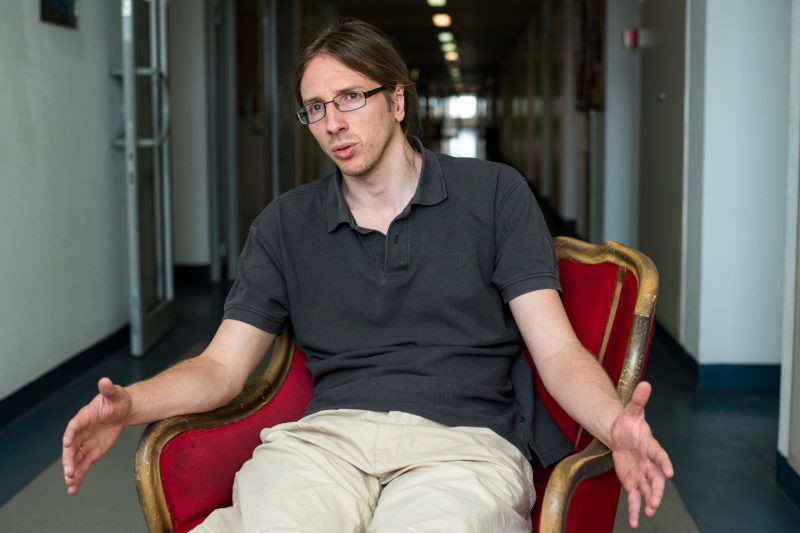Domonkos Sik on Solidarity in Times of a Pandemic
The Results of an Online Survey in Hungary

“Sociological questions, such as solidarity, should not only be relevant for social scientists, but also for all of us, as these questions bring us closer to understanding our own reality, our own possibilities,” Professor Domonkos Sik explained in the very beginning of his presentation based on the paper titled Solidarity in Times of a Pandemic—The Results of an Online Survey in Hungary, which he is currently working on together with Ildikó Zakariás, Research Fellow at the Hungarian Academy of Sciences.
Professor Sik pointed out in his lecture that solidarity is at the crossroads of more scientific fields, such as sociology, moral philosophy, political science, and social policy, thus, in its essence, is a broad interdisciplinary concept. Solidarity, as Professor Sik explained, may be a performative tool for social integration and political force, moreover, it serves as a basis for the moral sentiment behind social redistribution.
No wonder, he concluded, that influential sociologists—e.g., Durkheim, Habermas, Honneth, and Bourdieu—were, throughout their œuvre, drawn to revisit the notion of solidarity.
While solidarity is usually a subconscious compassion of humans, social crises, such as the current COVID pandemic, naturally trigger emotional and affectionate human responses—bringing the individual and collective imperatives for practicing solidarity to the forefront. The social trends of the modernity and late modernity—i.e., globalization, the emergence of the risk society, the shift from local community-based solidarity to social security, acceleration of the information society, and the identity-based reframing of solidarity—however, as Professor Sik suggested, had made solidarity contingent and network-dependent. Thus, even in times of crises, certain groups are challenged to access/benefit from state-organized solidarity measures.

Domonkos Sik—photocredit: 24.hu
Professor Sik conducted the research and its supporting survey in Hungary, where, he explained, the aforementioned challenges of late modernity are amplified by the local social and social policy distortions. The main questions of his research, in this context, were:
- How did the Hungarian society react to the social crisis of the pandemics?
- What were the idealtypical positions in the field of solidarity?
- What were the key dynamics?
The dataset of the research is based on an online survey—reaching 800 participants—performed in June 2020. The results of the survey showed that there are 5 idealtypical segments in the Hungarian society based on what health/psychological/financial/care support individuals receive from their family/friends/state/civil society during the pandemic, and what health/psychological/financial/care support individuals provide to their family/friends or as civil activists. These 5 idealtypical segments, identified by the research, are the following:
- unsupportive deprived segment (21% of the sample): individuals in this group face “above average” problems related to the pandemic; receive “above average” support from family/friends/state/civil society, however, they are critical towards the quality/quantity of support they are given; they provide “below average” support to others
- broker of solidarity segment (10% of the sample): individuals in this group face “above average” problems related to the pandemic; receive “above average” support from family/friends/state/civil society, however, they are critical towards the quality/quantity of support they are given; they provide “above average” support to others via helping friends and performing civic actions, etc.—therefore, they benefit from, but also establish solidarity ties
- negligent bystander segment (42% of the sample): individuals in this group are neither getting, nor giving any help
- private supporter segment (14% of the sample): individuals in this group face “above average” problems related to the pandemic; receive very little or no support from family/friends/state/civil society, however, they provide help to friends/family members who are in need
- volunteer activist segment (13% of the sample): individuals in this group do not need any support, but provide support in the form of civil activism
The survey also showed that individuals in the unsupported deprived segment are in a disadvantageous position on the labor market, they access limited cultural capitals, and often experience exclusion/discrimination. Individuals belonging to the broker of solidarity segment also lack cultural capital, work in precarious sectors, and experience exclusion/discrimination, however, their income level is “above average.” Negligent bystanders have secure financial backgrounds, possess cultural capital, and are not exposed to exclusion/discrimination. Private supporters live from “average” income, access “below average” cultural capital, and suffer no exclusion/discrimination. Individuals in the volunteer activist segment are usually highly educated, their earnings are “above average,” and have experienced exclusion/discrimination/social suffering, which is highly likely to have contributed to their volunteering attitude.
Professor Sik pointed out that, based on the representative research:
Approx. 2/3 of the Hungarian society do not initiate solidarity ties during the pandemic. Those who can be referred as active supporters (approx. 1/5 of the Hungarian society) usually either struggle with their structural hardships (brokers) or take the position of a reflective activist (volunteers).
The research undoubtedly suggests that the unsupportive groups constitute the majority of the society. It is also inevitable that despite the fact that every segment experienced extra burdens due to the pandemic, the chance for moving extra supplies of solidarity is still little, as the presence of activism in the Hungarian society is low.
Professor Sik also added that as the supply of solidarity is shrinking during the 2nd and 3rd waves of the pandemic, the role of state programs, such as social security interventions, is becoming more and more important. Without these direct interventions, he said, there is an increasing risk of a solidarity crisis to come—leading to a situation where a large portion of the society is left behind.
The open lecture was streamed via Facebook by Eötvös Loránd University International.

